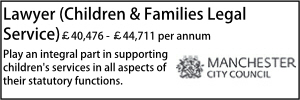

The final say
News
Must read
Families refusing access to support
Features Test

Producing robust capacity assessments and the approaches to assessing capacity

Disability discrimination and proportionality in housing management

Cross-border deprivation of liberty

Dealing with unexplained deaths and inquests

Court of Protection case update: May 2025
Features

Producing robust capacity assessments and the approaches to assessing capacity

Disability discrimination and proportionality in housing management

Cross-border deprivation of liberty

Dealing with unexplained deaths and inquests

Court of Protection case update: May 2025
Sponsored articles
What is the role of the National Trading Standards Estate & Letting Agency Team in assisting enforcement authorities?
Webinars
Is Omeprazole the new EDS?
More features
Provision of same-sex intimate care
Court of Protection case update: April 2025
High Court guidance on Article 3 engagement in care at home cases
‘Stitch’, capacity and complexity
Issuing proceedings in best interests cases
Court of Protection case law update: March 2025
The Health and Social Care (Wales) Bill Series – Regulation and Inspection of Social Care
The Health and Social Care (Wales) Bill Series – Direct Payments for NHS Continuing Healthcare
What is the right approach to Care Act assessments?
Disabled people in immigration bail: the duties of the Home Office and local authorities
Capacity, insight and professional cultures
Court of Protection update: February 2025
Setting care home fees
Could this be the end for local authority-provided residential care?
“On a DoLS”
It’s all about the care plan
Court of Protection case update: January 2025
Mental capacity and expert evidence
Best interests, wishes and feelings
Capacity, sexual relations and public protection – another go-round before the Court of Appeal
Court of Protection Update - December 2024
Fluctuating capacity, the “longitudinal approach” and practical dilemmas
Capacity and civil proceedings
Recovering adult social care charges via insolvency administration orders
Court of Protection case update: October 2024
Communication with protected parties in legal proceedings
The way forward for CQC – something old, something new….
The Ombudsman, DoLS and triaging – asking the impossible?
Outsourcing and the Human Rights Act 1998 – the consequences
Commissioning care and support in Wales: new code of practice
Government proposes requiring mediation in disputes over SEN provision
- Details
Parents and local authorities who disagree over special educational provision for a child could be required to go through mediation before an appeal can be made to the First-tier Tribunal (SEN and Disability), the Department for Education has proposed.
The move is part of a package of measures for overhauling the educational and health support given to such children, with the government hailing the reforms as the biggest shake-up in 30 years.
The Green Paper – Support and Aspiration: A new approach to special educational needs and disability – said: “We believe that it is important to have an independent forum where such disagreements can be resolved and that parents have the right to appeal; we have no plans to remove parents’ right to appeal to the First-tier Tribunal if they disagree with decisions made by local authorities. However, while it is important for this right to continue, we know that parents can find the appeal process stressful.”
The Department for Education suggested it would be better for parents and a better use of public funds if disputes about assessments and statements are resolved earlier and through non-judicial means. It acknowledged the work that the Tribunal is already doing in encouraging resolution of cases before a hearing.
Where mediation has been used by West Midlands authorities, four out of five cases reached a settlement without going to the Tribunal, it said. The Green Paper added that dispute resolution services were “under-used and under-promoted”, with an average of little more than one mediation per authority per year and more than half of authorities reporting no mediations during one year.
The Green Paper said: “We propose that parents and local authorities should always try mediation before a parent can register an appeal with the Tribunal, but we do not want this to affect the time that parents have to appeal or to change parents’ right to appeal.”
The Department for Education also announced that it would pilot giving children the right to appeal and make disability discrimination claims in two or three local authorities with a view to extending the right to all children across England. Such a right has been recommended by the United Nations Committee on the Rights of the Child.
“The pilot will test whether the right to appeal is something that children would use, the best way to handle these appeals, and the cost implications of this change,” it said.
This pilot comes as the Ministry of Justice consults on its proposed changes to legal aid. These would mean that legal help and advice would no longer be available to parents to help them prepare appeals to the Tribunal in SEN cases.
Legal aid will still be available where it is now for parents to make disability discrimination claims on behalf of their children, “that is, legal help and advice for First-tier cases and legal representation for cases that go before the Upper Tribunal”. The MoJ is expected to publish its response to the consultation in late spring.
Other key proposals in the Support and Aspiration Green Paper are:
- Inclusion of parents in the assessment process and, by 2014, a legal right giving them control of funding for the support their child needs.
- Replacement of statements with a single assessment process and a combined education, health and care plan (also by 2014). This will mean that health and social services is included in the package of support along with education
- Ensuring assessment and plans run from birth to 25 years old
- Replacement of School Action and School Action Plus with a new school-based category “to help teachers focus on raising attainment”
- An overhaul of teacher training and professional development
- The setting out by local authorities and other services of a local offer of all services available
- Giving parents “a greater choice” of school, either a mainstream or special school. Parents and community groups will have the power to set up special free schools
- Introducing greater independence from local authorities in the assessment of children’s needs. The government will look at how voluntary groups could coordinate the package of support.
The government said the reforms would address problems such as parents battling to get the support their child needed, SEN statements not joining up education, health and care support, and children falling between the gaps in services or having to undergo multiple assessments.
The Department for Education also said it wanted to tackle “a confusing and adversarial assessment process, with parents’ confidence in the system undermined by the perceived conflict of interest where the local authority must provide SEN support as well as assess children’s needs”.
Children’s Minister Sarah Teather said: “We have heard time and time again that parents are frustrated with endless delays to getting the help their child needs, and by being caught in the middle when local services don’t work together.
“Parents and voluntary organisations have given us overwhelming examples where they have felt let down by local services. At the moment there is an appalling situation where public money is being wasted as children are growing out of equipment, like wheelchairs, before they even arrive. The new single assessment process and plan will tackle this issue and mean that parents don’t feel they have to push to get the services they are entitled to.”
Responding to the Green Paper, Baroness Shireen Ritchie, chairman of the Local Government Association’s children and young people board, said: “The aim of creating a single system for people up to the age of 25 with special educational needs is one which the LGA supports. However, more work needs to be done on how to make this ambition a reality.
“Talk of realigning systems simply does not go far enough. What the system needs is a radical transformation built on a firm legislative base.”
Baroness Ritchie said there needed to be a system that joined up SEN provision in schools with that in further education colleges. She also called for sufficient funding to ensure that council support for SEN to be continued at its current level.
“In the recent local government financial settlement, councils saw funding for early intervention cut by 25%,” Baroness Ritchie added. “Councils have been leading the way on giving parents greater control over their children’s education through personalised budgets, but the government needs to make sure that the funding from health, education and social care is available to meet these costs.”
The Green Paper also sets out proposals to help children that have a learning need, but not necessarily a special educational need.
The consultation runs until 30 June. For more information, click here.
Philip Hoult
London Councils launches supplementary consultation on grants scheme
- Details
London Councils has launched a supplementary consultation on the future scope of its London Boroughs Grants Scheme, after obtaining a legal opinion on equalities issues.
The group, which also received expert advice from from the Equalities and Human Rights Commission, has designed the consultation as an addition to the original consultation that it ran last year.
The move follows a High Court ruling in February, when Mr Justice Calvert-Smith declared that a decision by the leaders’ committee of London Councils on 14 December 2010 adopting a categorisation of currently commissioned services and deciding on the timing of proposed changes and transitional arrangements in respect of the scheme was unlawful.
London Councils had reached its decision without due regard to its statutory equalities duties under the Race Relations Act 1976, the Sex Discrimination Act 1976 and the Disability Discrimination Act 1995, the judge added.
Following the ruling London Councils pointed out that its proposed budget still stood. It had set the budget for 2011/12 at £17.8m, down from £26m.
The supplementary consultation is seeking views on:
- The categories proposed by London Councils
- Any alternative scheme of categorisation “as long as it ties in with the objectives of the review and the agreed principles and priorities for the future programme (bearing in mind the review looks to devolve decision making down to a local level)"
- The categorisations of existing commissions. London Councils has already undertaken a preliminary categorisation of each commission
- Anything to be added to or amended in responses to the original consultation on equalities impacts
- The timescale for decommissioning.
London Councils’ Corporate Director of Services, Nick Lester said: “Although the judicial review found that the original consultation was sound, it did rule that we needed to do more work to assess the detailed impact that changes to the scheme could have on equalities.
“We are now moving quickly to ensure we meet our equalities duties and to provide the voluntary sector with some clarity in this turbulent time."
The consultation will run until 5 pm on 8 April. More information is available here.
Philip Hoult
More trouble with MEG
- Details
The Court of Appeal has handed down its much-anticipated decision in MIG and MEG (now known as P and Q), ruling that neither of the two sisters were deprived of their liberty. Lucy Series says the judgment is a troubling one.
The recent Court of Appeal judgment that two young women – ‘MIG’ and ‘MEG’ (but now known as P and Q) – were not deprived of their liberty in a foster home and a care home has the merits of being rather more clear, concise and consistent than the High Court judgment. These benefits notwithstanding, however, I’m afraid I still found it rather a disappointing, and I shall try to spell out why below. For those of you with little time to spare, here are the ‘headlines’ of what troubles me:
- The reliance on whether a person is ‘objecting’ to their placement is problematic because: (a) it diverges from the central message of the Bournewood judgment; (b) it fails to protect the Article 5 rights of people who lack the wherewithal to object and the Article 8 rights of their families
- The different comments by different judges appear to conflict on whether previous or possible alternative care arrangements are relevant to whether ‘deprivation of liberty’ is occurring.
- ‘Loss of autonomy’ and the exercise of coercive control is yet further removed from considerations of whether a person is deprived of their liberty or not.
- I think the case introduces a distinction between the meaning of ‘deprivation of liberty’ in the context of psychiatric detention and social care settings; a distinction that is not supported by much research into this area or my own experiences of working in these sectors.
Rejecting Bournewood?
According to the judgment, the appeal against the original decision rested on whether this passage from HL v UK (‘Bournewood’) meant that P and Q were deprived of their liberty: “...the Court considers the key factor in the present case to be that the health care professionals treating and managing [Mr HL] exercised complete and effective control over his care and movements from 22 July 1997, when he presented acute behavioural problems, to 29 October 1997, when he was compulsorily detained.” [91]
The Court of Appeal argued that being subject to “complete and effective control” was only determinative “in the present case” – in short, that whilst it might have meant that HL was deprived of his liberty, it did not follow that it meant other people in other circumstances would be. The court based its judgment on two primary grounds: whether the relevant person ‘objects’ to their placement, and whether it constitutes ‘normality’. I shall take these in turn.
“Objections”
Part of Parker J’s reasoning that neither MEG nor MIG were deprived of their liberty rested on them being happy in their placements [204]; this echoed earlier cases like that of TG v LLBC (2007, [105]) and Re MP (2009, [17]). The Court of Appeal took a different view; a person’s happiness is only relevant to whether a deprivation of liberty is in someone’s best interests, not to the question of whether it is occurring [24]. However, they did hold that whether a person “objects to the confinement which is imposed on her” is relevant [25].
The reasoning is important: “If a person objects to the confinement, the consequence will be conflict. At the very least there will be arguments and she will suffer the stress of having her objections overruled. More probably, as in the case of Miss Storck, there will be tussles and physical restraints and even perhaps her forcible return at the hands of the police. This level of conflict inherent in overruled objections seems to me to be highly relevant to the objective element. Equally, however, the absence of objections generates an absence of conflict and thus a peaceful life, which seems to me to be capable of substantial relevance in the opposite direction.” [25]
My points of disagreement can be summarised thus:
- there are people for whom it may be very difficult to infer whether or not they are “objecting to their confinement” but for whom we want to retain the right to say they are deprived of their liberty (HL, I will argue, fell into this category)
- It does not follow, in these cases, that “the absence of objections generates an absence of conflict and thus a peaceful life”. The difficulty turns on how one interprets ‘challenging’ behaviours.
In care homes and supported living services, there are a significant number of people for whom it will be difficult, if not impossible, to make sense of whether their behaviours can be said to amount to an “objection to confinement”. As a support worker in care homes and supported living, I sometimes worked alongside people who had profound communication difficulties; I do not mean merely that they could not speak, but in some cases any form of communicative exchange was problematic. They displayed behaviours such as self-harm, violent aggression towards staff, destruction of property, which certainly could be taken as evidence that they were unhappy in their placements, but it’s difficult to say whether they were “objecting to their confinement”, because that requires a certain degree of reflective insight into their situation. The danger is that for people like those I’m describing, no behaviour could ever be taken as a clear sign of objection because nobody would take them to “have the capacity to conceptualise any alternative unfamiliar environment” (MEG & MIG, 225), or even conceptualise their own confinement.
Put another way, for managing authorities (or even supervisory bodies) seeking to avoid the application of the safeguards, every possible sign of objection could potentially be interpreted a different way. How are you to distinguish whether a person attempted to break out through the kitchen window because they were “objecting to their placement” or just to their dinner? How are you to distinguish whether they escaped from the mini-bus on a trip out because they were “objecting to their placement” and not to the music on the stereo? How are you to distinguish whether they are self-harming because they hate their placement, they hate the staff and everyone in it, or because of some other reason that they cannot express? These are not mere philosophical trifles, interesting ‘problem of other minds’ examples. Examining (or failing to examine) why ‘challenging behaviours’ occur is the bread and butter of care provision, but it is not always easy to arrive at a conclusive answer.
I think HL himself may have fallen within this category. The original decision to admit him informally to Bournewood hospital was made in the context of his not objecting. The court heard evidence that he was “not distressed” by his admission, he was “fully compliant with treatment and never indicated that he wishes to leave the hospital”. The Health Service Ombusdman report paints a very different picture. On visiting him, his carers perceived him to be agitated and distressed. Where a person lacks expressive language, who is to say whether they are objecting or not? Even, whether they are distressed or not? What for some is a clear symptom of distress, may be ignored by others as a mere 'symptom' of mental disorder. The requirement that a person “objects to their confinement” is likely to place people who lack expressive language at a significant disadvantage; in short, they are much less likely to be deemed eligible for the safeguards.
Futhermore, the assumption that “the absence of objections generates an absence of conflict and thus a peaceful life” is not, in my experience, necessarily correct either. In the circumstances I have outlined above, where a person’s behaviour cannot be meaningfully said to be an “objection to confinement” or their placement in general, they may still be subject to considerable interventions – sometimes physical – which can only be described as “conflict”.
In my view, the older emphasis on the “degree and intensity” of restrictions (given in the code of practice and in European case law) is preferable; it brings the restrictive, sometimes combative, responses to these ‘ambiguous’ behaviours back within the analysis of whether deprivation of liberty is said to have occurred. It places the emphasis back on the use of coercive power within care settings, and does not make a requirement that we only respond to coercion when a person is able to frame a recognisable objection to it. And in many ways, people who are confined and subject to “complete and effective control”, who lack expressive language to describe what is happening to them, are the most at risk of abuse or excessive restrictions within their placement.
It should be recalled, furthermore, that a person may not “object” to a situation despite its being harmful to them; this is clearly recognised in case law where adults are removed – objecting – from the care of their families because it is said to be harmful for them (e.g., PCT v P). The requirement for objection means a person may be confined in a care setting, where they are subject to “complete and effective control”, where it is not in their best interests – yet by virtue of the fact they are unable or unwilling to express it, they are denied the powerful benefits of the safeguards. We recognise in other areas of mental capacity law that a person’s apparent compliance or consent may be subject to coercion or even habit, yet not be in their best interests – it seems counterintuitive and contradictory to abandon this principle here.
“Normality”
The situation of MEG and MIG was distinguished from that of HL by reference to where they were confined. There is said to be a spectrum of normality, whereby “the most normal life possible” is in the family home, “not much less normal” in an adult foster placement, and “even when the person lives in an institution rather than in a family home, there is a wide spectrum between the small children's home or nursing home, on the one hand, and a hospital designed for compulsory detentions like Bournewood”. [28].
I want to score a cheap point first. I wonder how many adults today would regard it as “normal” to continue living with their parents, or “not much less normal” to be in an adult foster placement – or a care home, or nursing home? It’s a cheap point, but it highlights a more important and complex issue. “The most normal life possible” is the operative phrase here, where “possible” means “for that individual (with their disabilities), in our society today”. By what criteria do we assess “normality”? It cannot be familiarity to the confined person, otherwise lifers in prison could not be regarded as “detained” after a certain number of years. Does it mean “most common”? The number of people cared for in a particular kind of service? Or does it mean something closer to “acceptability” within the bounds of what our society consider a “normal” way to deliver care? I suspect the latter, although it is clearly impossible to ascertain what the intended meaning was.
I want to briefly consider another case, which I think might turn out to have a bearing on this and related cases. The Grand Chamber of the European Court of Human Rights recently heard the case Stanev v Bulgaria (note: judgment still awaited in this case, but a webcast of the hearing is here). In this case, it was argued that Mr Stanev was deprived of his liberty in Pastra care facility in Bulgaria. Bulgaria responded that they weren’t “detaining” him but providing him with a home (this recalls paragraph 230 of MIG & MEG in the High Court). Counsel for Stanev argued that Bulgaria had a positive obligation to provide him with support in the community, to avoid the need for detention. Such an argument could easily have been made in the domestic case, Re RK. Counsel for Stanev also point out that the living conditions in the Pastra care home had been described as constituting “inhumane and degrading treatment” by the UN Committee for the Prevention of Torture. Bulgaria responded that perceptions of treatment were “individual and subjective” and “will depend on their mentality and social status”.
Almost certainly, the care received by MEG and MIG is of a higher quality than that endured by Mr Stanev. But the point is this: in Bulgaria, Mr Stanev’s conditions may be as “normal” for someone with his disabilities and in his social circumstances as MEG and MIG's are here. If we want to retain the right to say he is deprived of his liberty in Pastra care home, we cannot do so by reference to their not being “normal”. We can only do so by reference to the degree of coercion and confinement he experiences, but this is precisely the analysis that is denied to us by this judgment. Yes, it could be distinguished by reference to dignity and “living conditions”, but where living conditions are characterised by coercive control, should they be ignored from the analysis?
Another way of looking at it is this: why is psychiatric detention regarded as more paradigmatic of “deprivation of liberty” than care in the family home? Because, I venture, it is assumed to be less restrictive. I think this is a belief that underpins this aspect of the judgment. It does not fit with the ‘aesthetic’ or dominant discourses surrounding social care to admit that they might, at times, be very restrictive and coercive environments. My experience, and reports like this, this, this and this (I could go on - but I won't) testify that this assumption may be misinformed.
The most restrictive environment I ever worked in was a supported living service where residents all received one-to-one, sometimes two-to-one “continuous supervision and control”. Service users were frequently shut in their rooms for “time out” (whether they wanted it or not); some service users were daily placed on “reins” for long periods of time. All the service users were subject to frequent physical interventions and PRN medication to “calm them down”. I challenge anyone to argue that this is “less restrictive” or “more normal” than psychiatric detention; yet the courts are coming dangerously close to taking at face value that ‘supported living’ services and care homes are just that.
This judgment does not allow us to say the residents I supported were deprived of their liberty; such care could easily be argued to be “the most normal life possible” for people in their position (whether it is a “good life” is another question). To quote Keith Ewing, in a wonderful article entitled The Continuing Futility of the Human Rights Act, “the answer lies only with the Lewis Carroll and George Orwell schools of treaty and statutory interpretation”. That is to say, the courts are coming close to taking ‘deprivation of liberty’ to mean what it suits them to mean, reflecting what we want to believe about social care, and thus engaging in Orwellian Newspeak, à la 1984.
A note on families, conflict and "safeguarding"
One final passing comment on a possible issue for families and Article 8 rights. There have been cases where a person has been removed from the family home for ‘safeguarding’ or other reasons, where the safeguards may no longer apply. Sometimes, as in the case of MEG and MIG there are excellent reasons for not permitting a person to return to the care of their families.
But there are cases, like that of LLBC v TG and that of G v E, where the “safeguarding” allegations were later held to be false, and where it was found to be in the “best interests” of the relevant person to return to their family’s care. In the first place, TG was not “objecting”; in the second case, it was not clear that E was either (although it is said he “showed signs” of preferring to return to his foster carer).
If such cases came up today, managing authorities could lawfully refuse to apply for authorisation for the placement on the grounds the relevant person was not objecting. Supervisory bodies could refuse to authorise it, on the grounds they were not objecting. This would leave the families without access to the deprivation of liberty safeguards, which they might well need to challenge the placement. The safeguards provide families and “detainees” with access to expert independent advocacy services, non-means tested legal aid, and the right to refer their case to the Court of Protection without fee or “permission”.
Yes, these cases could technically be challenged by way of judicial review; but there are drawbacks to this remedy. In the first place, the Court of Protection is a specialised court for dealing with these cases – whereas the administrative courts are not. In the second place, there is no guarantee that legal aid for judicial review would be granted, it being subject to both means and merits tests. In the third place, a finding that the removed family member was “deprived of their liberty” would bring the case into the realm of a “limited” human rights, which might have rather more force before the court than “qualified” Article 8 rights or the vagaries of community care law.
A court might hesitate to authorise a deprivation of liberty where a person is manifestly better off being supported to remain with their family; but if it can hold that they are not “deprived of their liberty” because they are not objecting, it may find that the breach of the family’s Article 8 rights is justified in the face of other considerations (chiefly – the cost considerations of supporting them at home).
Lucy Series is a researcher in the University of Exeter’s School of Law, specialising in human rights law and community care. Lucy can be contacted by email at
Her blog can be read here.
Further reading: Care for sisters with learning disabilities not a deprivation of liberty: CoA
Ministers consult on making unfair age discrimination in goods and services unlawful
- Details
The government has launched a consultation on plans to make it unlawful to unfairly discriminate against someone because of their age when providing goods and services, with the new rules set to apply to the public as well as private sectors.
In the consultation the Government Equalities Office also proposed that there should be no specific exceptions for health and social care. “The plans will eliminate harmful discrimination while allowing justifiable and beneficial age-based practices, for example in public health programmes,” it said.
The new rules are expected to come into force in Great Britain (but not Northern Ireland) in April 2012. They will apply equally to the young as well as the old, although not to children under 18.
The consultation proposes some exceptions to the ban, however. One will see companies allowed to continue to offer beneficial services to certain age groups – “for example free bus travel for over-60s, or holidays aimed at people aged 30 and under”, the government said. Providers of financial services, such as insurance companies, will also be allowed to use age when assessing risk and deciding prices.
The government said organisations seeking to use an exception will have to “base such decisions on solid evidence rather than simply imposing a blanket ban”.
The GEO also suggested that: sports bodies would be permitted to impose age restrictions, such as running different teams and leagues for under-21s and veterans; residential park homes would be permitted to include age restrictions in their admission rules; and immigration authorities would be “allowed to treat people differently because of their age where it is necessary for them to fulfil their functions”.
Equalities Minister Lynne Featherstone said: "It's high time we put an end to outdated stereotypes based on age and recognised the valuable contributions that people of all ages can make to our society and economy. When older people are turned away from the market place through unfair treatment, the economy misses out on increased business and revenue.
"These proposals will ensure that doesn't happen, providing new protection and support for people of all ages. However, we don't want to throw the baby out with the bathwater, which is why we will allow businesses to continue to provide the age-specific services that many people of all ages benefit from every day."
Care Services Minister Paul Burstow said that by not seeking any exception from the application of the Equality Act 2010, the Department of Health was sending “a clear message” that there was no place for age discrimination in the NHS.
This follows reports by the British Geriatrics Society and a Health Ombudsman report on care and compassion, which suggested that older people “do not always receive the same standard of care from the NHS as younger patients”.
The minister also pointed to the Age Review carried out in 2009 which identified a number of areas in health and social care where age discrimination was most likely to occur. The review published a number of recommendations on the best way for the ban on age discrimination to be introduced.
Burstow added: “There can be no place for arbitrary age discrimination in the NHS. We know that older people are not always treated with the dignity they deserve because of ageist attitudes.
“Our population is ageing as more of us live longer. The challenge for the NHS is to look beyond a person's date of birth and meet the needs of older people as individuals.”
The Department of Health stressed that the Equality Act 2010 did not aim to prevent age discrimination when there were beneficial or justifiable reasons for it, only harmful discrimination.
“Commissioners and providers of NHS and social care services should continue to make sensible, clinically justifiable decisions based on age for relevant services such as eligibility for screening and vaccination programmes that are based on the best evidence available,” it said.
The Department cited a number of examples of clinical decisions based on age which would not be affected by the ban. These include:
- Cervical cancer screening programme
- NHS Health Checks
- Seasonal flu vaccination
- IVF treatment
- NHS charges
But it also suggested examples of the type of harmful discrimination the ban aimed to end such as:
- “Making assumptions about whether an older patient should be referred for treatment based solely on their age, rather than on the individual need and fitness level
- Not referring certain age groups for a particular treatment or intervention (such as those not of working age) that are considered mainly, but not exclusively for working age adults
- Not considering the wellbeing or dignity of older people.”
NHS South West produced a resource pack that includes a self assessment toolkit for health and social care organisations, a guide for NHS commissioners and providers and a guide for social care.
The proposals can be downloaded from the Government Equalities Office website. The consultation will last for three months.
Philip Hoult
Welsh Assembly Government announces "game changing" overhaul of social care system
- Details
The Welsh Assembly Government has given councils in Wales until the end of the year to come up with proposals to develop regional social care commissioning and delivery as part of a radical package of measures aimed at tackling duplication between Welsh local authorities.
The measure is amongst the proposals contained in the Assembly's new framework for social care – Sustainable Social Services for Wales – A Framework for Action.
The framework document said: “We have made a considerable investment in building an understanding of how this approach can be made a reality. We now expect delivery and we will expect regulators and inspectors to work together to assess progress in delivering integrated services.”
Welsh ministers will seek powers to enforce the changes if councils do not come up with satisfactory proposals by the end of the year.
The measures announced by the Assembly also include the establishment of a National Adoption Agency for Wales – to replace the 23 agencies in Wales at present – and the creation of a national outline contract for care homes to improve consistency of services. The document also recommends the introduction of portable assessments of need, so that users will not need to be re-assessed if they move between different council areas.
The Assembly Government intends to establish a National Outcomes Framework, a set of focused, published, high level indicators, and to require local authorities to involve the users of social care more in the design of services. It will also encourage the creation and development of social enterprises in the provision of social care.
Other proposed measures include:
- Reducing the number of Local Safeguarding Children Boards and cutting back on the detailed guidance sent out by government.
- Rolling out Integrated Family Support Teams and re-ablement services across Wales.
- Changing the approach to target setting and the type of guidance issued, with providers and commissioners of services becoming accountable for quality and safety to allow for a better focused and streamlined regulation and inspection.
- Supporting social workers and social care workers to apply their own professional judgement.
The assembly government warned the changes were needed with the system facing "real and unsustainable increases in demand". Key to this, it added, will be to “ensure that services are centred around the citizen. Users and their carers will have a much stronger voice and greater control over services. Services will be built around people – not around organisations.”
Describing the process as "a recasting of the legislative framework for social services in Wales", the Deputy Minister for Social Services, Gwenda Thomas, said: “This is a visionary statement on the future of our social services for the next decade. We have used this opportunity to think carefully about the small number of big changes that we need to focus on to make a positive impact and renew social services in Wales.
“Social services must become sustainable but sustainability means much more than funding. It will require more fundamental changes than simply becoming smarter at what we already do. We need to focus on what is really important and ensure that we are all working to the same ends by securing more efficient and effective ways to deliver services through greater collaboration and integration. This paper gives us the means to do that.”
The document is available for download at the following link: SustainableSocialServicesforWales
Government announces changes to Vetting and Barring scheme
- Details
The government has announced the content of the forthcoming Protection of Freedoms Bill, which will significantly reduce the scope of the Vetting and Barring scheme and lead to the merger of the Criminal Records Bureau (CRB) and the Independent Safeguarding Authority.
The merged body will be responsible for providing a more "proportionate" checking service for those adults that come into contact with children, which will see many of the 4.5m adults covered by the previous scheme removed from the need for checks. Those in regular contact with children will continue to be vetted, but many who do occasional, supervised volunteer work will not.
The bill promises a "portability of criminal records checks between jobs to cut down on needless bureaucracy" and to stop "employers who knowingly request criminal records checks on individuals who are not entitled to them". Job applicants will also be able to see the results of their criminal record check before their prospective employer so mistakes can be corrected.
The changes follow a review of the vetting and barring scheme initiated in June last year and coincide with the publication of the review's findings. A copy is available online at the following link: Home Office VBS Report.
The recommendations of the review, which are expected to be included in the bill, include:
- A state body should continue to provide a barring function to help employers protect those at risk from people who seek to do them harm via work or volunteering roles.
- The Criminal Records Bureau (CRB) and Independent Safeguarding Authority (ISA) should be merged and a single Non-Departmental Public Body or Agency created to provide a barring and criminal records disclosure service.
- The new barring regime should cover only those who may have regular or close contact with vulnerable groups.
- Barring should continue to apply to both paid and unpaid roles.
- Automatic barring should apply for those serious offences which provide a clear and direct indication of risk.
- Registration should be scrapped – there should be no requirement for people to register with the scheme and there will be no ongoing monitoring.
- The information used by the state barring body (currently the ISA) to make a barring decision should be serious in nature.
- Criminal records disclosures should continue to be available to employers and voluntary bodies but should be revised to become portable through the introduction of a system which allows for continuous updating.
- The new regime should retain current arrangements for referrals to the state barring body (currently the ISA) by employers and certain regulatory bodies, in circumstances where individuals have demonstrated a risk of harm to children or vulnerable adults.
- The current appeals arrangements should be retained.
- The state barring body should be given a power to vary review periods in appropriate circumstances.
- Services relating to criminal records disclosure and barring provisions should be self-financing. We recommend the Government consults on raising the cost of the criminal records disclosure fee to cover the costs incurred.
- The new system will retain two offences; it will continue to be an offence for a barred person to work with vulnerable groups in regulated activity roles. It will also be an offence for an employer or voluntary organisation knowingly to employ a barred person in a regulated activity role.
Children's Minister Tim Loughton said: "The new system will be less bureaucratic and less intimidating. It will empower organisations to ask the right questions and make all the appropriate pre-employment checks, and encourage everyone to be vigilant. Protecting children and keeping them safe remains our top priority, but it's also important that well meaning adults are not put off working or volunteering with children."
The forthcoming bill will also contain measures to restrict the investigative and monitoring powers available to local authorities and crime prevention agencies. These include the introduction of a code of practice for CCTV and Automatic Number Plate Recognition Systems to make them more proportionate and effective, and the right for any member of the public to refer a local authority for judicial review if their cameras are being used inappropriately. A new Security Camera Commissioner will ensure public bodies abide by the new code of conduct, reporting annually to Parliament and naming and shaming organisations using their cameras inappropriately.
Home Secretary Theresa May said: “The first duty of the state is the protection of its citizens, but this should never be an excuse for the government to intrude into people’s private lives. I am bringing common sense back to public protection.”
Page 253 of 270
Locums
Case Law Update

The final say
In association with...

Poll
in association with...

Events

Directory































